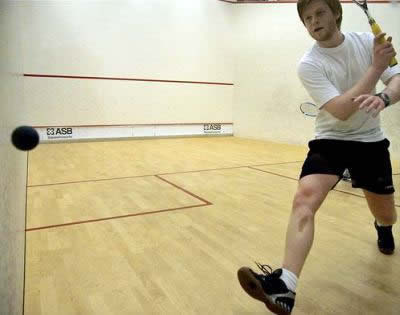The squash backhand shot is generally a harder shot to play than the squash forehand shot. The reasoning behind this is that its not as natural to swing through the ball as it is on the forehand.
Squash Backhand Preparation
Like most shots though with practice it becomes much easier. Preparation is also key with the squash backhand. It’s about getting your racket head up high behind your shoulder in good time before you’re ready to swing through and hit the ball.
(Photo Credit: flickr.Marcus)
Positioning
The shoulder of your racket arm should be facing the front wall as you prepare for this shot. Your arm needs to be bent at the elbow and your racket should be up high. Preparing in this way enables you to swing through at the ball with maximum power.
Eyes On The Ball and Control
At all times keep your eyes glued to the ball as you are playing the shot. As you strike the ball try and maintain control. Accurate control of the shot placement is of utmost importance. Once you have mastered control greater speed and power will come later.
The Follow Through
After you have connect with the ball on the backhand the follow through is equally as important. The racket head should finish quite high after the follow through and your body should now be facing towards more of the front court. Again control is important as you don’t want an erratic whipping follow through that puts your opponent in any danger.
Practice Routine
When I first started playing squash to practice my backhand I would try and hit 10 shots in succession from just a few feet away from the front wall. If I managed to complete 10 in a row without and errors then I would move back another foot or so. I continued with this routine until I was able to successfully hit more than 10 shots in a row from the very back of the court.
The backhand shot in squash is an essential technique that requires proper form and execution. Here are the key points for improving your backhand:
Proper Grip and Racket Position
- Keep your racket in front of you, not behind your body. This allows for a smooth, swinging motion.[1]
- Maintain a “semi-cocked” wrist position with the racket head above the ball.[2]
Body Positioning
- Rotate your upper body towards the back corner at the start of the swing.[2]
- Get your shoulder in a starting position underneath your chin.[2]
- Keep your hips square to the front wall.[4]
Swing Mechanics
- Create a “diamond” position with your racket head, wrist, shoulder, and elbow at the start of the swing.[2]
- Swing from low to high in a smooth, swinging motion, hitting the sweet spot of the racket.[1][4]
- Generate power from shoulder rotation and weight transfer, not just the wrist.[4]
- Follow through with your arm straight and away from your body for a fluid motion.[3]
Footwork and Balance
- Bend your knees and lunge into the shot to get low and balanced.[4]
- Keep enough distance from the ball to step into the shot.[4]
- Watch the ball hit the front wall after you’ve hit it.[1]
Practice and Refinement
- Continuously practice and experiment to find the technique that works best for you.[1]
- Focus on maintaining an open racket face, shoulder turn, weight transfer, and pushing the ball to the front wall.[4]
- Emulate the technically sound backhand of top players like Amr Shabana.[4]
By following these tips and practicing regularly, you can develop a consistent and powerful backhand shot in squash.[1][2][3][4]
More Squash Backhand Posts
How Does Shoulder Rotation Impact The Power Of The Squash Backhand
According to the provided sources, proper shoulder rotation is crucial for generating power and consistency on the squash backhand. Here are the key points: Shoulder Rotation Generates Power Rotating your upper body and shoulders towards the back corner at the start of the backhand swing allows you to load up and generate torque from your […]
How Can I Correct My Wrist Position To Improve My Squash Backhand Consistency
Based on the provided sources, here are the key points to correct your wrist position and improve backhand consistency in squash: Maintain a Semi-Cocked Wrist Position Keep a "semi-cocked" wrist position with the racket head above the ball at the start of the swing.[1][3] Avoid having a completely flat or floppy wrist, as this produces […]
What Is The Diamond Position In Squash
The diamond position in squash refers to the specific body and racket positioning at the start of the backhand swing. It helps set up proper technique and generate more power and consistency. Here are the key points about the diamond position: What is the Diamond Position? It involves creating a diamond shape with your racket […]
How Can I Improve My Backhand Consistency In Squash
To improve your backhand consistency in squash, you need to focus on proper technique and form. Here are the key points: Proper Grip and Racket Position Keep your racket in front of you, not behind your body. This allows for a smooth, swinging motion.[3] Maintain a "semi-cocked" wrist position with the racket head above the […]
